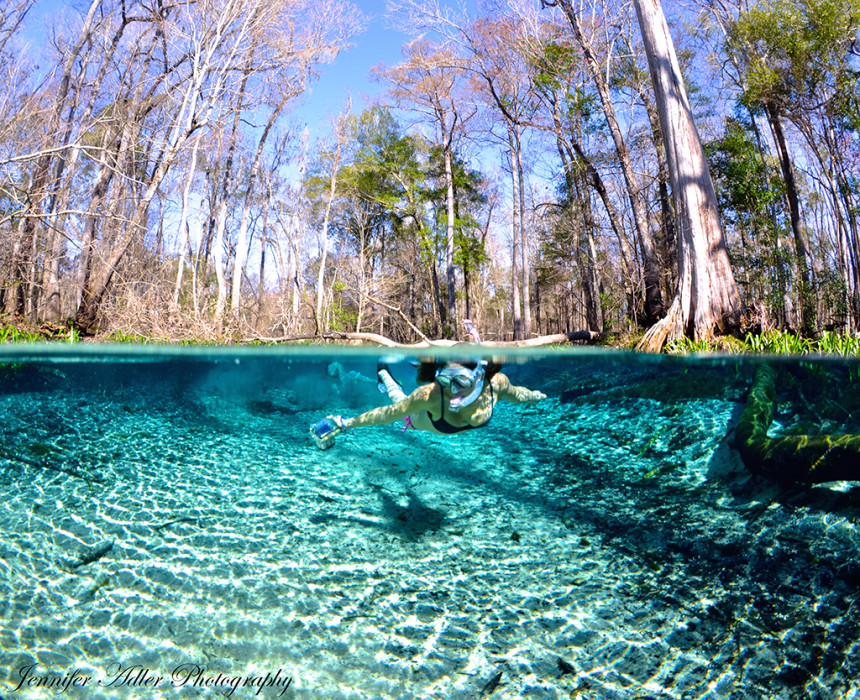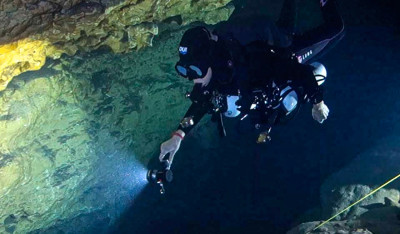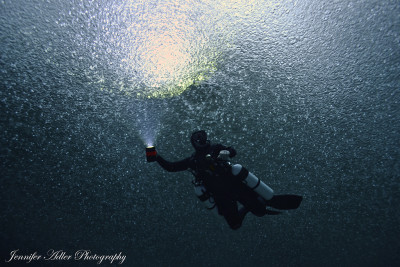

Jenny earned a Bachelor of Science in Marine Biology from Brown University in 2011. After graduating, she moved to Gainesville to work as a biologist at US Geological Survey and immediately fell in love with the springs and underwater photography. At UF, she is currently pursuing a PhD in Interdisciplinary Ecology, with a minor in journalism and science communication. Her dissertation blends science with art and writing to raise awareness about Florida’s springs and water resources, and her work also includes helping with communications and outreach at the UF Water Institute. She is a divemaster and cave diver, rarely found above water and seldom seen without a camera in hand.
By Jenny Adler
Water is one of the quintessential characteristics of Florida – visitors flock to the Sunshine State to visit its beaches, rivers, lakes, and springs. In Florida, we live on top of our main water supply: beneath our feet, the water winds its way through pores, crevices and tunnels in the dark limestone aquifer, out of sight, out of mind, just like water issues. The PIE Center’s 2015 Public Opinions of Water in Florida report, released this week, supports this idea that Floridians care about water but are not necessarily informed about water issues.
It was water that originally brought me to Florida – although my undergraduate degree is in marine biology, I moved from Massachusetts to Gainesville to work as a biologist at USGS. I studied the effects of the Deepwater Horizon oil spill on mesophotic reefs and also researched sturgeon – ancient, dinosaur-like fish that are most well known as the massive, jumping fish of Florida’s blackwater rivers. It was during long field days spent on the Suwannee that I was first introduced to springs and also became familiar with the issues surrounding Florida’s water resources. In subsequent work as a biologist and a graduate student, I have come to appreciate the importance of rigorous science.
 But I have a growing interest in sharing this science with a broader audience, which is what has led me to the College of Journalism and Communications here at UF. It has also brought me to my current work at the UF Water Institute, where researchers from a diverse array of disciplines collaborate on cutting edge water-related projects. I am continually impressed by the caliber of the research performed by both professors and fellow graduate students, but I have also learned firsthand that there is a disconnect between science and public understanding with regards to Florida’s water issues, an idea addressed in the PIE Center’s water survey.
But I have a growing interest in sharing this science with a broader audience, which is what has led me to the College of Journalism and Communications here at UF. It has also brought me to my current work at the UF Water Institute, where researchers from a diverse array of disciplines collaborate on cutting edge water-related projects. I am continually impressed by the caliber of the research performed by both professors and fellow graduate students, but I have also learned firsthand that there is a disconnect between science and public understanding with regards to Florida’s water issues, an idea addressed in the PIE Center’s water survey.
What emerges from the data presented in the 2015 Public Opinions of Water in Florida report is that Floridians care about water – 85% of Florida residents say they are likely to pay attention to water news stories. But 52% of respondents said they had not seen news coverage about water issues in Florida in the past month (and an additional 20% were “not sure”). Results also suggest that the public is clearly in favor of preserving land and water throughout Florida, with more than three-quarters of respondents (77%) indicating they would be likely or very likely to vote to support water conservation programs. This closely mirrors the recent passage of Amendment 1 by 75% of voters in the November 2014 election.
However, in terms of actual knowledge of water policies, the grand majority was not familiar with concepts such as Basin Management Action Plans, Total Maximum Daily Loads, Florida Springs Initiative, and other specific policies.
The results indicated water ranked 3rd in a list of key Florida issues, behind healthcare and the economy. Eighty four percent of the respondents said water is highly or extremely important, whereas healthcare and the economy received 89% and 87% importance, respectively. But water is the economy in Florida, where we rely heavily on the tourism industry, which revolves around clean and healthy beaches, lakes, and springs. Agriculture, another major Florida industry, also relies on access to plentiful, good quality water. And clean drinking water is of course integral to our health and survival. Floridians understand that water is important, but I hope to help people more clearly see the fundamental link between water, economy, and health.
As we move forward and work to bridge the gap between current scientific understanding and public knowledge of water issues, there is a lot we can learn from the results of the survey, and it can help us better understand the most effective ways to communicate with the general public.
For example, according to the survey, people are willing to take advantage of water-related information through websites and TV coverage (68% and 59%, respectively), while they are less likely to attend a seminar or conference (12%) or get trained for a regular volunteer position (10%). With the understanding that we have a public that cares and is willing to learn, combined with specific information about how they will most effectively learn, we are given an incredible opportunity (which will also be a challenge) to share current water research and knowledge about water issues through these identified outlets.
We as water researchers and communicators can therefore do a better job of conveying water information to the public in ways that are accessible and convenient for them. I hope my work at the Water Institute and in my graduate studies will help bridge the gap between science and public understanding of water issues – I believe that a caring and informed public has the ability to make incredible, positive changes for Florida’s water, themselves personally, and for future generations.
For more information about current research at the UF Water Institute, visit http://waterinstitute.ufl.edu

















